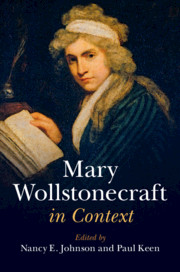Book contents
- Mary Wollstonecraft in Context
- Mary Wollstonecraft in Context
- Copyright page
- Contents
- Illustrations
- Notes on Contributors
- Preface
- Frontispiece
- Chronology
- Part I Life and Works
- Part II Critical Fortunes
- Part III Historical and Cultural Contexts
- The French Revolution Debate
- The Rights of Woman Debate
- Philosophical Frameworks
- Chapter 16 French Philosophes
- Chapter 17 Dissenters
- Chapter 18 Jean-Jacques Rousseau
- Chapter 19 Edmund Burke
- Chapter 20 William Godwin
- Chapter 21 Political Theory
- Chapter 22 Feminist Theory
- Legal and Social Culture
- Literature
- Suggested Further Reading
- Index
Chapter 18 - Jean-Jacques Rousseau
from Philosophical Frameworks
Published online by Cambridge University Press: 16 January 2020
- Mary Wollstonecraft in Context
- Mary Wollstonecraft in Context
- Copyright page
- Contents
- Illustrations
- Notes on Contributors
- Preface
- Frontispiece
- Chronology
- Part I Life and Works
- Part II Critical Fortunes
- Part III Historical and Cultural Contexts
- The French Revolution Debate
- The Rights of Woman Debate
- Philosophical Frameworks
- Chapter 16 French Philosophes
- Chapter 17 Dissenters
- Chapter 18 Jean-Jacques Rousseau
- Chapter 19 Edmund Burke
- Chapter 20 William Godwin
- Chapter 21 Political Theory
- Chapter 22 Feminist Theory
- Legal and Social Culture
- Literature
- Suggested Further Reading
- Index
Summary
It is difficult to overstate the influence of Jean-Jacques Rousseau on the works of Mary Wollstonecraft. Writing to Gilbert Imlay from France in 1784, she contemplated buying their daughter a sash “to honour J. J. Rousseau … and why not?—for I have always been half in love with him.”1 Half in love, indeed – and half infuriated. Wollstonecraft’s excoriating attack on Rousseau’s gender politics in A Vindication of the Rights of Woman (1792) is well documented, as is the seemingly pernicious role played by Julie, or, The New Heloise (1761) in the fate of Wollstonecraft’s literary alter ego, Maria, whose Rousseauvian fantasy of romantic love ends in abandonment. Recently, however, critics have begun to give more nuanced accounts of Wollstonecraft’s Rousseauism, delineating a complex pattern of enthrallment, identification, and antagonism which not only shapes her political, pedagogical, and philosophical convictions but also her literary self-construction.2 Her oeuvre suggests a broad and detailed knowledge of Rousseau’s corpus, acquired from primary texts and secondary sources. His natural and political philosophy informs her Historical and Moral View of the French Revolution (1794), where she refers explicitly to the Second Discourse (1754) and The Social Contract (1762), and her Letters Written during a Short Residence in Sweden, Norway, and Denmark (1795). In her Original Stories from Real Life, she strives to adapt the pedagogical theory of Emile, or On Education (1762) to a practical educational text for children of both genders. Her reviews and private letters also imply some acquaintance with the Letter to D’Alembert (1758); the Letters Written from the Mountain (1764); the unfinished Emile and Sophie (1780); the infamous Confessions (1782); and the melancholic Reveries of the Solitary Walker (1782).3 Given the breadth of her knowledge, a comprehensive account of her Rousseauism is impossible in this short chapter, but the two sections that follow offer brief insights into two relatively neglected areas. The first identifies Rousseau’s penchant for paradox as a defining influence on Wollstonecraft’s oeuvre, exemplified by her enigmatic literary self-portraiture. The second examines how this fascination with paradox informs her reading of Rousseau’s Heloise and her portrayal of the connections between authentic expressions of female desire and the creative imagination.
- Type
- Chapter
- Information
- Mary Wollstonecraft in Context , pp. 155 - 163Publisher: Cambridge University PressPrint publication year: 2020
- 2
- Cited by



